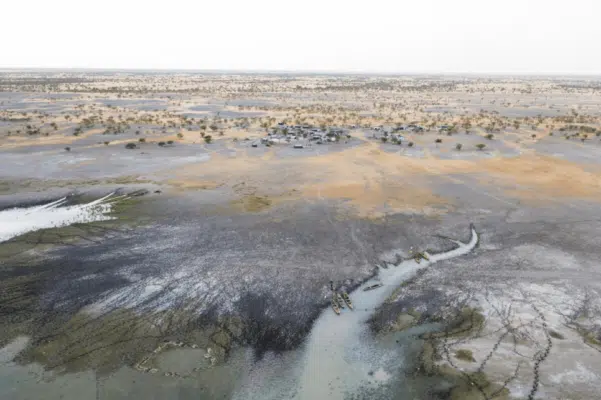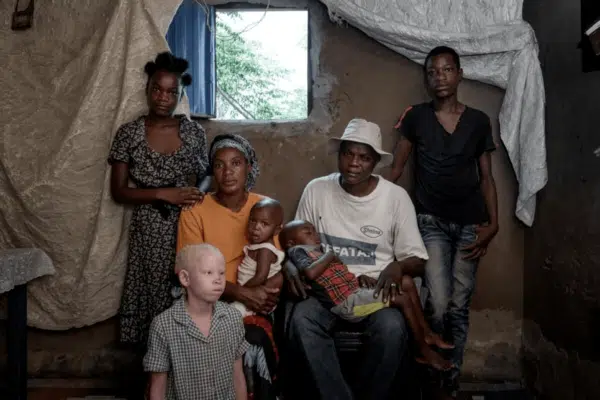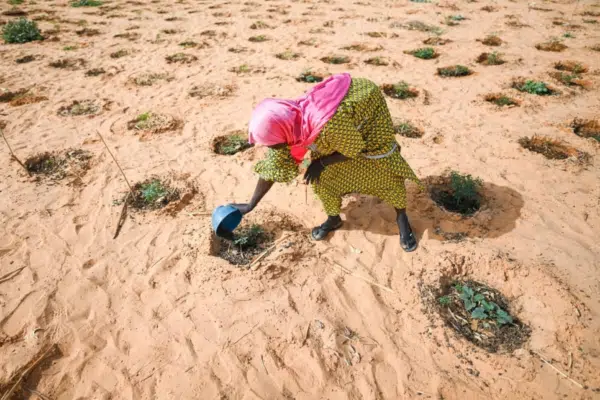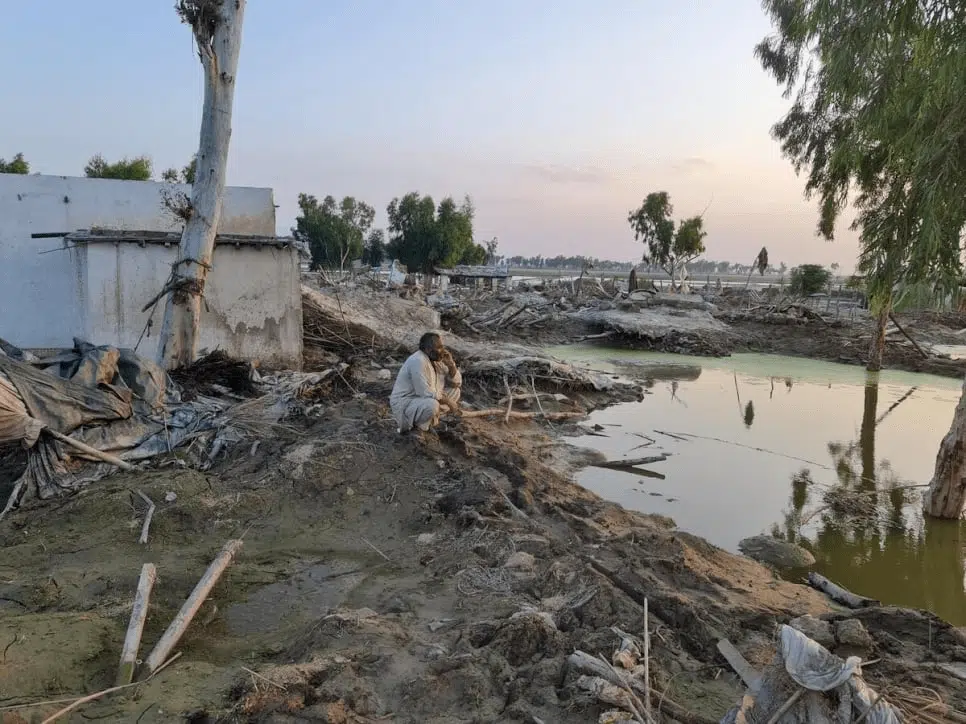
An Afghan refugee whose home was destroyed by torrential rains and flooding sits among the debris in Pakistan’s north-western Khyber Pakhtunkhwa province. © UNHCR/Qaiser Khan Afridi
At this year’s climate summit, displaced people warned that their attempts to adapt to the changing climate are being overwhelmed by repeated extreme weather events.
As talks at this year’s UN Climate Conference – COP27 – looked set to continue in Sharm El-Sheikh, Egypt today, the UN Refugee Agency’s Special Advisor for Climate Action Andrew Harper called for refugees and displaced people to be recognized in the summit’s final agreement, and given a say in future negotiations.
“Refugees and displaced people are among those most exposed to the climate crisis,” he said, noting that over 70 per cent of the world’s displaced people come from the most climate-vulnerable countries. “Many are seeking safety in climate vulnerable countries that have done the least to contribute to climate change and yet have the least resources to adapt.”
He called for scaled-up financing for countries on the frontlines of the climate emergency, which are often the same countries providing protection to refugees.
“In many regions, attempts at adaptation have been overwhelmed by the pace of climate change,” he said. “We must be prepared for inevitable loss and damage, such as displacement, for which additional resources must be mobilized.”
The issue of “loss and damage” caused by climate change is on the official agenda for the first time at this year’s meeting, and hard-hit developing countries have been united in their demands to mobilize funding from countries with historically high carbon emissions to help them prepare for and recover from climate-driven disasters.
Recent devastating floods in Pakistan, South Sudan and elsewhere, and a prolonged drought and looming famine in the Horn of Africa have increased pressure on countries to make progress on the issue, but the latest draft outcome document lacks details on when or how a loss and damage fund will be established.
“Loss and damage” refers to the devastating impacts of climate shocks and pressures, such as cyclones, floods, droughts and sea level rise, on people’s safety, homes and means to live with dignity. “There is no greater example of loss and damage than of having to flee your home to seek refuge,” said Harper.
This is what happened to 12-year-old Assad, a refugee from Sudan who, on top of being affected by conflict, saw his entire community engulfed by flooding nearly a year ago. He suffered fractures to his leg when a mud-brick house collapsed on him and his cousin.
Addressing delegates at COP27 alongside other people displaced on the climate frontlines, he recounted how he and his family then fled to Egypt.
“I lost my family, my friends, my home and my dreams in Sudan,” he said. “And that is why I am coming today to ask, with the voice of every child, for rich countries to help the poor countries so they can face disasters.”
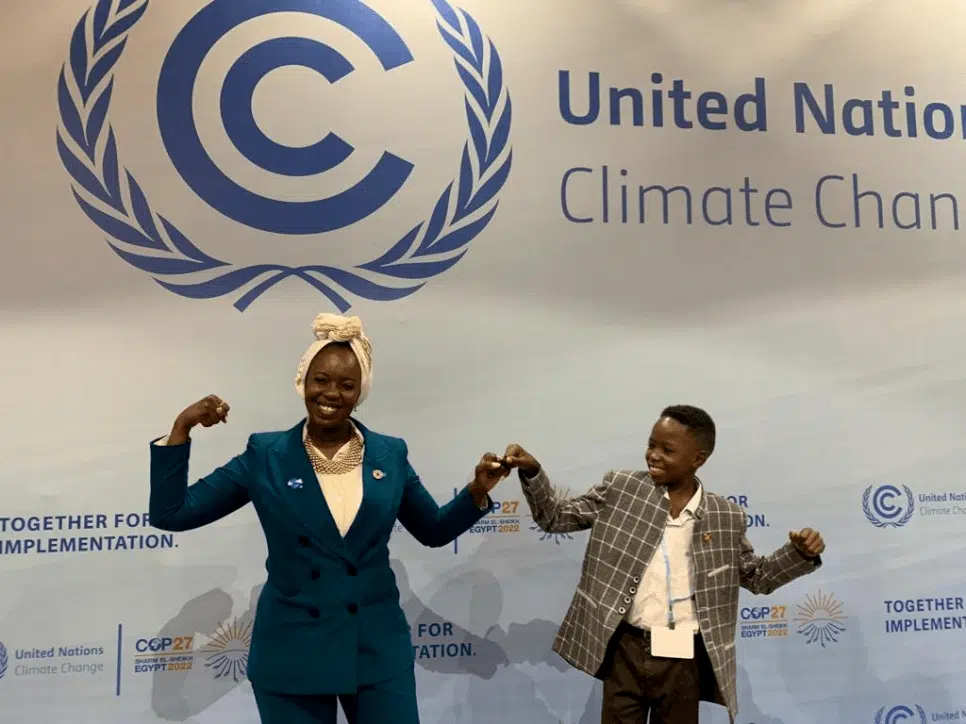
UNHCR Goodwill Ambassador Emtithal Mahmoud meets Assad, a 12-year-old Sudanese refugee. They both participated in a panel discussion involving displaced people at COP27. © UNHCR
Also on the panel was Koyam Boulama Falmata from Niger, who was initially displaced by conflict but forced to flee again after flooding destroyed her fields and livestock. She now lives in a makeshift shelter in a drought-prone area of the country where, she said, life was extremely difficult. “My children don’t go to school, there is no drinking water or health care. It is even hard to find food because we no longer grow anything.”
“For everyone on this panel, this is a life or death question.”
Other panellists spoke about the work they are doing to try to mitigate and adapt to the changing climate. Eman Al-Hamali, a displaced woman from Yemen, talked about the solar microgrid plant she and a group of other women are managing. The plant delivers affordable and sustainable energy to her community and generates an income for the women.
Opira Bosco Okot, a South Sudanese refugee, formed an organization with other young people after seeing how climate change was disrupting farming and worsening poverty in the refugee settlement in Uganda where he lives. The organization is replacing trees cut down for firewood and supporting their community to find their own ways of coping with climate change.
“My key message to global leaders is to come forward and support refugee-led organizations which are doing interventions to combat the climate crisis,” said Opira.
During the conference, Andrew Harper noted that only 4 per cent of adaptation finance currently goes to Africa. UNHCR is calling for more support for developing countries’ National Adaptation Plans, including measures that strengthen the resilience of displaced people and their host communities as global heating fuels further crises and forces more people to flee.
UNHCR Goodwill Ambassador, poet and former Sudanese refugee, Emtithal (Emi) Mahmoud called for displaced people to be not just included in adaptation plans, but present at every stage of planning responses.
“For everyone on this panel, this is a life or death question,” she said. “Next year, I expect to be in the negotiation rooms, and for all of us to have a voice there. I think we’re ready, and we’ve been ready and it’s time for us to be included.”
Harper echoed her call for displaced people to have seats at the table at COP28 “to ensure decisions are not taken about them, without them.”
Originally published by UNHCR on 18 November 2022.



